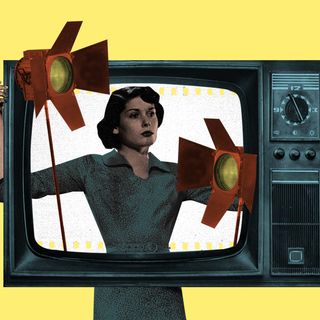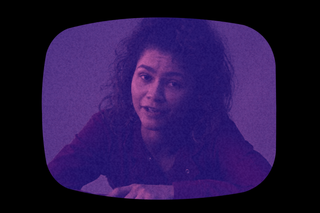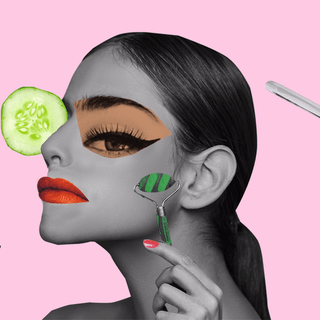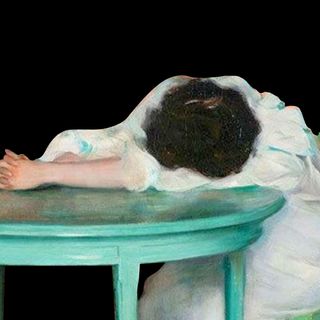
‘Euphoria’ Finally Addresses the Unreliable Narrator in the Room
Rue is at once honest and deceptive, manipulative and vulnerable, and gives new meaning to the trope.

This article contains spoilers for season 2, episode 3.
The unreliable narrator is an enduring fascination in media and literature. Why do they exist? Is it to unravel the idea of one truth in a narrative? We usually meet unreliable narrators in some stage of sociopathy or madness, or both. Here, in Euphoria, we meet the unreliable narrator in a drug addled teenager who is at her most reliable to tell the truth when she is most vulnerable. In a way, we confront the unreliable narrator as a version of ourselves (minus, in presumably most cases, the drug-addled part).
The question that Euphoria asks isn’t whether Rue is a reliable narrator for us, but whether she is one to herself. Season 2, episode 3 takes us into the world of the narrator with surprising candor, pulling no punches about who it is who is weaving this thread of post-modern teenagedom together: someone who isn’t at peace with themselves, but doesn’t know it either.
We start, inexplicably, with Cal’s backstory — the first time an adult was given one, and the longest time the show has spent on this segment yet. Why? Is it to make the point that the innocence of youth has always been fleeting and lost to the darkness? Is it to make us sympathize with the worst person on TV right now? Nobody is quite sure, except everyone can grudgingly agree that the scene in the gay bar with his best friend Derek was undeniably beautiful and heartbreaking.
At some point we’re left to wonder: is Rue, the narrator, different from Rue, the character? How does the narrator know so much about everyone? We can think of it, as one Reddit user hopefully imagined, as a scene from the distant future where she narrates the pieces of this story to Ali, her Narcotics Anonymous mentor and parent figure, over a peaceful morning toast. Rue might be an unreliable narrator because of her unreliable memories: her teen years spent in a crack haze mean that she isn’t entirely sure why certain stories are relevant and to whose plot, exactly, except that they’re there.
And so we see Cal’s backstory because it’s there. It feels a bit like being in Rue’s head, where thoughts don’t need a reason to exist. They simply do. Teenagers are the most unreliable of narrators because they dare you to challenge the validity of their stories and musings.
Related on The Swaddle:
Why Does ‘Euphoria’ Insist on Sexualizing Teen Girls?
Except, not quite, when you realize that there might be a subtext: Is this Cal-Derek story an inverse of Rue’s and Jules’ relationship, and is that why Rue takes the time to show us this love that never-was? There must be a reason beyond exposition for all of these backstories. At some point, there are hints that by telling us this story, Rue is actually telling us something else — something she never speaks out loud. And that’s how doomed her love for Jules is, how dishonest and corrupted by manipulation and lies. But more on this later.
The scene where Euphoria brings this all together is when it cuts back to the present, back to Rue’s trance-state where she swings and sways her way around the house in unfiltered joy and abandon. It is heartbreaking to know that we can’t and won’t see her this way when she’s sober. Perversely, it almost makes us root for her to stay this way, knowing that her substance addiction is the only way it is possible.
When Rue later shows off how slickly she manipulates Gia, she’s also showing off how slickly she manipulated us in believing that there’s no hope for her happiness without drugs. We unwittingly enable this side of Rue, and in a meta-presentation she show us exactly how. Step 1: use a cover drug. Step 2: gaslight. She wins, up until this confession. Because from here on, we see through everything without needing her to explain it quite so smugly. The person she is really gaslighting is herself.
In this episode, we are forced to ask: through all the bravado and smug self-satisfaction, is Rue really the self-aware, in-control storyteller that she makes herself out to be? There is a break in which this is brought into sharp focus through Lexi Howard. Rue calls her an “observer” who is detached from the travails of her own life and pretends like she is in a movie. Lexi likes to think, we are told, that she sees her life from an objective distance. Rue likes to think that she isn’t like Lexi, that she really sees what’s what.
And through this sudden break in story-telling with the Lexi interlude, we see how unreliable narrators often don’t know how unreliable they are to themselves. They think they are in control of the narrative and are tricking listeners and audiences. But really, they’re tricking themselves.
Rue’s nonchalance in showing us her cruel indifference towards others’ feelings, the ease with which she lies, are all red herrings to have us believe that she is telling an authentic story of herself. But it is when Rue is absent from a scene that we see all the things she never really showed or told us: her lack of care and support for Jules, her emotional unavailability, her selfishness in love.
But there is also — and this is most striking — her possible asexuality, which she herself hasn’t come to terms with. We know so much about Rue that she doesn’t know about herself, or doesn’t want to admit — not from what she tells us, but from what she doesn’t. Indeed, she actively tries to hide so much from us. Unlike most unreliable narrators that we know and (perhaps) love, at the end of the day, Rue is misleading nobody but herself.
Rohitha Naraharisetty is a Senior Associate Editor at The Swaddle. She writes about the intersection of gender, caste, social movements, and pop culture. She can be found on Instagram at @rohitha_97 or on Twitter at @romimacaronii.
Related


How Online Skincare Routines Obscure the Privilege Required for Good Skin
